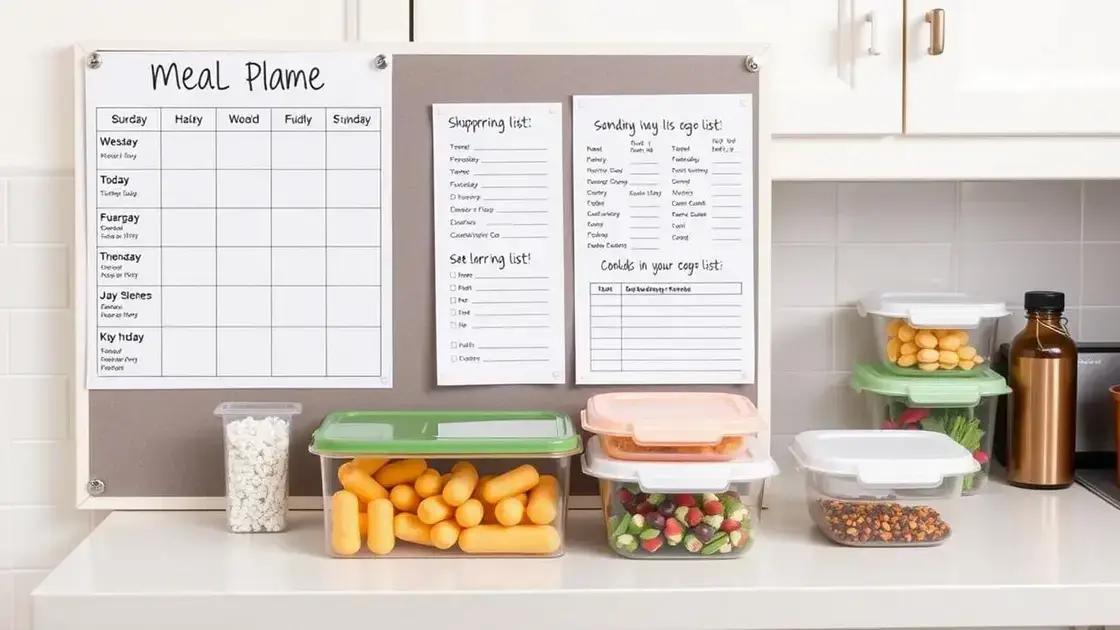To create a balanced daily meal plan for optimal health, include a variety of foods from all food groups, focus on essential nutrients, adjust for dietary needs, and use practical meal planning tips to maintain a nutritious diet while ensuring flexibility and simplicity.
Planning your meals is crucial for maintaining a healthy lifestyle. How to create a balanced daily meal plan ensures you get the right nutrients day by day. By understanding what your body needs, you can craft delicious meals that support your health goals. In this guide, we will delve into the essentials of a balanced meal plan and offer practical tips for success. Whether you’re looking to lose weight, gain muscle, or simply eat healthier, a well-structured meal plan is your roadmap to achieving those objectives.
Understanding a Balanced Meal Plan

To understand a balanced meal plan, it’s important to know what balance means in the context of nutrition. A balanced meal plan provides the right amounts of nutrients your body needs to function well. This plan should include a variety of foods from different groups like fruits, vegetables, grains, proteins, and dairy.
Components of a Balanced Meal Plan
A balanced meal plan typically consists of:
- Fruits and Vegetables: Aim for at least half your plate to be filled with colorful fruits and vegetables.
- Whole Grains: Choose whole grains like brown rice, whole wheat bread, and quinoa to fuel your body with energy.
- Protein Sources: Include lean meats, beans, nuts, and tofu to help build and repair tissues.
- Dairy or Alternatives: Incorporate low-fat dairy or fortified plant-based alternatives for calcium and vitamins.
Portion Control
Understanding portion sizes is critical for a balanced meal plan. Using small plates can trick your mind into feeling full sooner. Check food labels or use measuring cups to ensure you’re eating appropriate portions.
Meal Timing
Regular meal timing supports your body’s metabolism. Try to eat three main meals and a couple of small snacks each day to maintain energy levels and avoid overeating at meal times.
Listening to Your Body
Everyone’s needs are different. Pay attention to how your body feels after eating. Adjust your meals based on hunger cues. Some days you may need more food, while other days less. Each body is unique and should be treated as such.
Essential Nutrients to Include

In order to create a balanced daily meal plan, it is vital to include essential nutrients. These nutrients support overall health and help your body function properly. Here are the key nutrients you should incorporate into your meals:
Carbohydrates
Carbohydrates are the body’s main source of energy. Opt for whole grains like oats, brown rice, and whole wheat pasta for sustained energy.
Proteins
Proteins play a crucial role in building and repairing tissues. Good sources include lean meats, fish, eggs, dairy, and plant-based options like beans and lentils.
Fats
Healthy fats are important for brain health and hormone production. Include sources like avocados, nuts, seeds, and olive oil in your diet.
Vitamins and Minerals
Vitamins and minerals support various bodily functions, including immunity and bone health. Eating a variety of fruits and vegetables ensures you get a range of these nutrients.
Fiber
Fiber aids in digestion and helps keep you full longer. Incorporate high-fiber foods like fruits, vegetables, whole grains, and legumes into your meals.
Water
While not a nutrient in the traditional sense, staying hydrated is vital for overall health. Aim to drink enough water throughout the day to support all bodily functions.
Tips for Meal Planning Success

Effective meal planning can make a big difference in adhering to a balanced diet. Here are some tips for meal planning success that can help simplify your process:
1. Set a Weekly Plan
Choose one day a week to plan your meals. Look at your schedule and plan for busy days. Knowing what to cook in advance saves time and reduces stress.
2. Keep it Simple
Choose easy recipes that don’t require many ingredients. Quick meals can be just as nutritious and delicious. Simple recipes help you stay on track without feeling overwhelmed.
3. Create a Shopping List
Based on your meal plan, create a shopping list. Stick to this list while shopping to avoid buying unnecessary items. This helps manage your budget and ensures you have all necessary ingredients.
4. Prep in Advance
Spend some time prepping meals or ingredients in advance. Cut veggies, cook grains, or marinate proteins ahead of time. This will make meals quicker to assemble during busy days.
5. Mix and Match
Make extra portions and use them in different meals. For example, grilled chicken can become a salad, a sandwich, or a stir-fry. This keeps meals interesting and reduces food waste.
6. Stay Flexible
Be prepared to adjust your plan as needed. Life can be unpredictable, so it’s okay to switch meals around or incorporate leftovers. Flexibility helps you stay committed without feeling guilty.
Adjusting Your Plan for Dietary Needs

When creating a balanced daily meal plan, it’s essential to adjust your plan for dietary needs. Different individuals have unique health requirements, preferences, and restrictions that should be taken into account. Here are some tips to help customize your meal plan:
Identify Dietary Restrictions
Determine if you or a family member has food allergies or intolerances. Common issues include gluten intolerance, lactose intolerance, and nut allergies. Avoid these foods and find suitable substitutes.
Focus on Food Preferences
Make sure to consider personal food preferences. If someone is vegetarian or vegan, ensure meals are plant-based and contain sufficient protein sources like beans, lentils, or tofu.
Consult a Professional
If you have specific health concerns or dietary goals, consider consulting a nutritionist or dietitian. They can help tailor your meal plan to meet your unique needs effectively.
Balance Macronutrients
Regardless of dietary needs, aim to balance macronutrients: carbohydrates, proteins, and fats. Adjust proportions according to individual goals, such as muscle gain or weight loss.
Monitor Portion Sizes
Pay attention to portion sizes, which may vary based on activity level and dietary needs. Use measuring cups or a food scale to help you maintain appropriate serving sizes.
Stay Informed
Always read nutrition labels and stay informed about what’s in your food. This helps in making better choices and can assist in adjusting your plan when necessary.
Taking Charge of Your Meal Planning Journey
Creating a balanced daily meal plan is not just about following guidelines; it’s about understanding your individual needs and preferences. By incorporating essential nutrients and adjusting your meals for dietary requirements, you can cultivate a nutritious eating habit.
Use practical tips for meal planning success, and remember that flexibility is vital. As you navigate through your meal planning, keep in mind the importance of simplicity and organization. This approach will help you maintain a healthy lifestyle without feeling overwhelmed.
Ultimately, taking the time to plan your meals ensures you meet your health goals effectively while enjoying the journey of discovering diverse foods and flavors.
FAQ – Frequently Asked Questions about Creating a Balanced Daily Meal Plan
What is a balanced daily meal plan?
A balanced daily meal plan includes a variety of foods from all food groups, ensuring you get the essential nutrients your body needs for optimal health.
How can I adjust my meal plan for dietary needs?
To adjust your meal plan for dietary needs, identify any food allergies or preferences, consult a nutritionist if necessary, and customize meals accordingly.
What are essential nutrients I should include?
Essential nutrients include carbohydrates, proteins, healthy fats, vitamins, minerals, fiber, and water. Each plays a significant role in maintaining your health.
What are some tips for successful meal planning?
Tips for successful meal planning include setting a weekly plan, keeping meals simple, creating a shopping list, prepping in advance, and staying flexible.
How often should I change my meal plan?
You should review and adjust your meal plan regularly, especially when your dietary needs or preferences change, to keep it aligned with your health goals.
Can meal planning help with weight management?
Yes, meal planning can help with weight management by encouraging portion control and encouraging healthier choices, reducing the chances of impulse eating.













